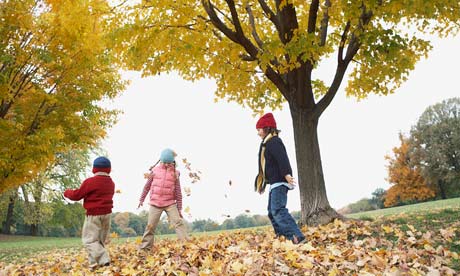
Colin Tudge: It is dangerous how cut off children are
We human beings need to stay in touch with nature for our own sakes – many a study shows how much better people feel when in sight of trees. Yet even more to the point, nature itself needs us to stay in touch. Many politicians and scientists have told us that we can and should "conquer" nature, and have called this "progress". In reality, nature will always be beyond our ken and way beyond our control, except here and there – but we do have the power to destroy vast swathes of it. In the end, the fate of all our fellow creatures and their habitats depends largely on our attitude towards them. But also whether or not we ourselves survive, and in what numbers and in what state, depends on how well we look after the rest. For our sake as well as theirs we need to give a damn.
But how can we give a damn if we spend our lives indoors? I was born in South London towards the end of the second world war – as townie as they come – but at least I knew what a sparrow was (they're rare now) and you couldn't put a spade into our tiny garden without cutting a worm in half, and the railway banks and bombsites teemed with horsetails and goodness knows what. We knew, too, that milk comes from cows and that old men can grow amazing carrots and runner beans on the meanest land. Ultra-urban we may have been, but at least we were in touch.
Now we have a generation who frankly are not. So how can they care if the countryside is sold off to the highest bidders, and used to park helicopters, and our crops come courtesy of Monsanto and our livestock lives in factories? They will know no other way.
But if we settle for the ultra-urban life, if we allow all wilderness to be compromised and hand our farming over to industrial chemists then, quite simply, the world will fall apart – as it is doing already. We have to rethink what agriculture is really for, and why, and why conservation matters – to us, as well as to other creatures. Changes of strategy begin with attitude and attitude begins with awareness.
So it isn't simply sad that the next generation is so cut off from nature. For the future of the whole world, it is a very dangerous state of affairs.
• Colin Tudge is author of Good Food for Everyone Forever, and co-founder of the Campaign for Real Farming
Aleks Krotoski: This is National Trust PR dressed up as science
I have no problem with arguments against technology. I recognise its limitations and its affordances. And so, when confronted by a high-profile document that fuels the uncertainty many people feel about the change in our behaviour ushered in over the last 150 years by screen-based media, rather than reaching into my pockets to support a noble cause, I consider withdrawing my membership from the source of the pseudoscience instead.
The National Trust's Natural Childhood report proposes that several social factors of modern life have divorced children from the great outdoors, and that this will have long-lasting consequences for society. It describes a syndrome called 'nature deficit disorder' – invented by author Richard Louv in 2005 in his New York Times bestseller Last Child in the Woods – that is sweeping the UK. Kids are "incarcerated" in their homes and only experience the natural world through computers, television and games.
I do not dispute the statistics presented by author Stephen Moss about children's outdoor time. This is a great starting point for further investigation. My problem is with the implied consequences of this "disorder," presented in a one-sided way and aimed at raising awareness among an already concerned demographic in the hope that they will reach deep into their pockets and donate their support to an institution that is promoting what is, as many accept, commonsense.
It is absolutely natural that the uncertainty that surrounds the behavioural transformations of our evolving relationship with screen-based media is confusing and fear-inducing. As with anything new, we are in a period of furious social scrutiny as we re-negotiate the boundaries of our relationship with the machine.
But public discourse needs to be balanced and critical. Using emotive language such as "electronic addictions" and "the extinction of experience", as this report does, undermines the so-called "science" that the National Trust is presenting in this document. Scientific claims are backed up by evidence. Preferably primary sources – not press releases.
Researchers have spent more than two decades untangling the web's effects on our lives, and have discovered where it disrupts our existing social practices, and where it doesn't. This is indeed an important issue for public scrutiny, but the method of wrapping up a half-truth in a lab coat and presenting it as an evidence-based review of the literature is as insidious as a PR company commissioning an academic researcher to find a predetermined outcome.
Evidence-based argument is the hallmark of the lively and informed debates we as a population have engaged in since the reformation, and is the cornerstone of an engaged and critical society. The 27-page press release published by the National Trust that describes a made-up disorder is only intended to inspire a reaction and fuel uncertainty. Rather than open up debate, this kind of thing serves to close it down. And that is just not scientific.
• Aleks Krotoski is a technology writer and the host of the Guardian's Tech Weekly podcast

